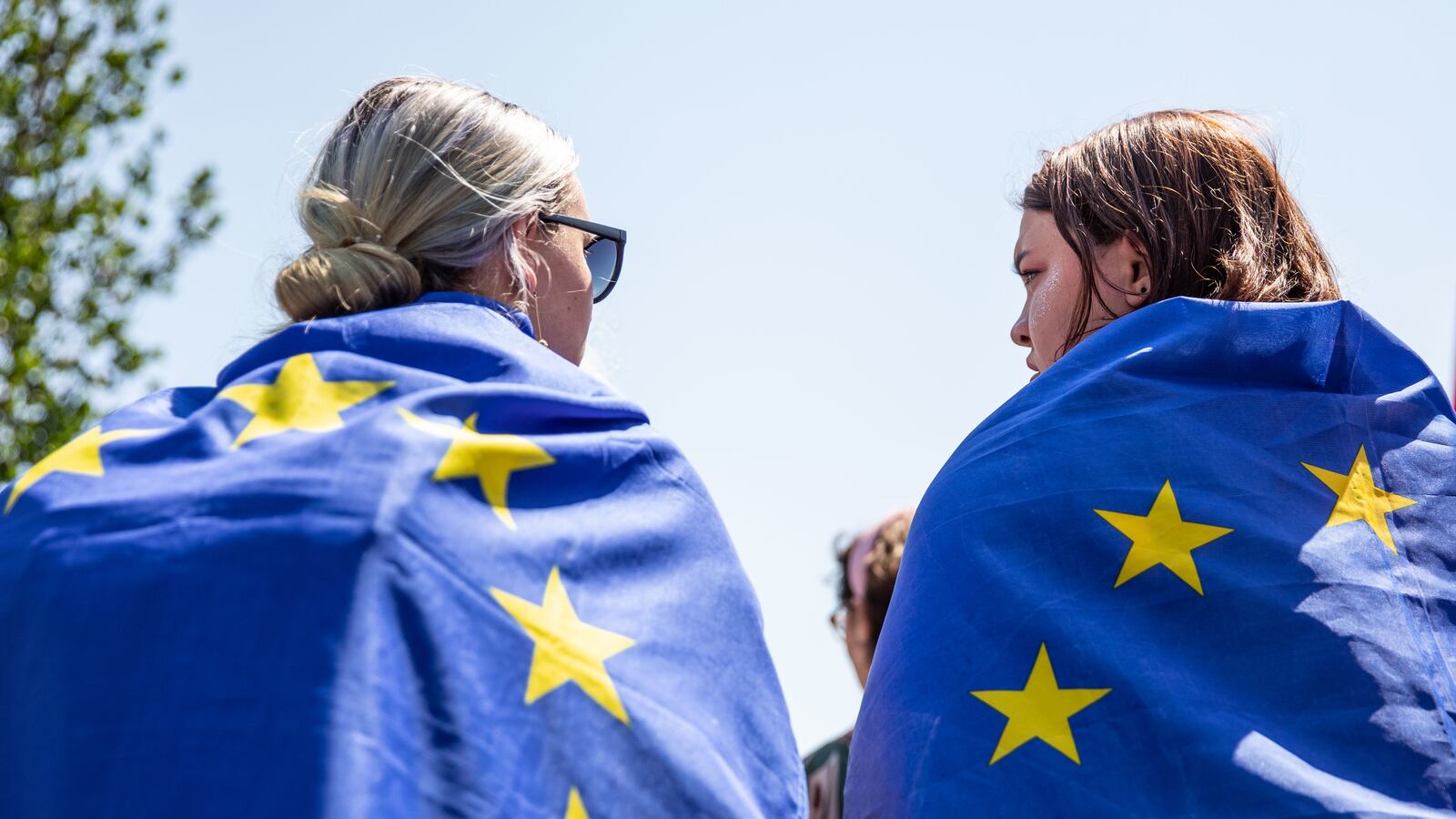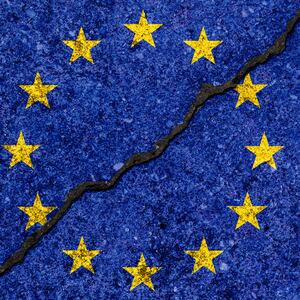BERLIN—A series of student-made film clips played in cinemas across Germany in the run-up to Sunday’s European Parliament elections. They targeted young people with simple ideas about choosing to do the right thing for the environment, even if it wasn’t all that easy: a boy opens the trash can to clear his plate before reconsidering and eating every leftover scrap in his kitchen; a girl is cycling along an empty field at dawn to catch a bus to Paris; a kid stretches reluctantly in his bathing suit before turning on the tap for an ice cold shower...
The message: “Everyone has a choice but not everyone has a vote: Make the European election about climate."
Across Europe, inspired by such messages—and fearful about the world they are inheriting from profligate politicians—that is precisely what young people set out to do. And if there are real lessons to be learned here (ones that may well be relevant in the United States), it is that politicians ignore young voters at their peril, and climate change is the issue that mobilizes a great many of them.
The results in the European elections were striking.
The public is weary of the established mainstream center-left and center-right parties. Everybody knows that. But much of the reporting and punditry suggested the result at the European polls would be sweeping gains for radical right-wing populist parties, some of them redolent of pre-World War II fascism, whose stated intent is to weaken the E.U. from within.
Instead, it was the Liberals and the Greens who stole the moment, and the political momentum, holding the populist tide in check everywhere except in Italy. The right-wing parties gained ground, true, but nothing like as much as had been expected.
The Greens, with double-digit scores in most of Europe’s biggest countries, secured 71 seats in the European Parliament, up from 52 seats five years ago. In Germany, Ireland, Finland, and France, Green parties surged. Even in Britain amid Brexit chaos, the Greens scored more than 11 percent of the vote, which put them ahead of the shattered Tory party.
“To see the Green Party beating the Conservatives so far in these elections is truly amazing,” Alexandra Phillips, a successful Green Party candidate for South East England, told AFP. “Something seismic is happening in British and European politics.”
The practical implications are significant. Given “the uptick of nationalism and populism,” the Belgian Green MEP Philippe Lamberts said, “to forge a stable European Union the Greens are going to be indispensable.”
Since a United Nations report last year predicted that there were only 12 years left to avoid climate catastrophe, students have been walking out of class across Europe to demand that their governments honor commitments to the 2015 Paris Agreement. “Fridays for the Future” often become massive demonstrations.
Sixteen-year-old Greta Thunberg from Sweden emerged as an iconic leader, and addressed the European Parliament herself last month. She blasted lawmakers for their repeated emergency summits about Brexit when there has been no emergency summit about “the breakdown of the climate and environment."
Even mainstream parties that previously paid little attention to the climate crisis tried to get on the right side of the issue, but far right nationalists, not so much.
“Many politicians across political parties reacted to people’s concerns on climate change in their campaigns,” says Annika Hedberg from the European Policy Center. “However, we also saw politicization of the fight against climate change, with some populist voices even suggesting that nothing needs to change.”
Zoe Kappel, a 16-year-old organizer in Berlin of school strikes for the climate, is certain about the issue mobilizing the young: “Climate change was the theme of the European elections and I’d say it wouldn’t have been without us.” But the issue obviously is bigger than that, and the movement has to be as well. “Climate change isn’t just happening in Europe, it’s happening in the whole world,” says Kappel.
On Friday, kids walked out of class in 125 countries. The teens who organize the rallies communicate internationally via WhatsApp, Discord and conference calls on Zoom. “If a politician sees people protesting all over the world, they can see that the climate crisis is not just a problem for their state or party, it’s something that involves everybody on the planet,” says Kappel.
In Berlin, 15,000 young people were out on the street Friday. At the city center, a young girl with glasses, a megaphone and a massive purple backpack marched ahead of her friends. But this wasn’t just kids’ stuff.
Pensioners in lab coats carried an Earth balloon on a stretcher. They said they were retired doctors and for them, the climate crisis is a health emergency. People are already dying in heat waves and the scary tiger mosquito is breeding in Europe. “In a medical emergency you have to act,” says Dr. Martin Herrmann, who is the chairman of the group.
As the procession approached the top of the hill in front of the German parliament, you could see how far back the demonstration went and what kind of emotion it was generating. Several people appeared to be choking up. One girl had tears running down her face. “I haven’t cried in three years,” she said.
The school strikers want to avoid climate catastrophe. But the right-wing populists in European institutions have different ideas. Alexander Carius, the managing director of the Berlin-based think tank adelphi, distinguishes between climate denialist parties like the U.K. Independence Party and “blood and soil” ecologists like Greece’s neo-fascist Golden Dawn party. Meanwhile, Marine Le Pen’s extreme-right Europe of Nations and Freedom bloc has regularly opposed major energy and climate legislation (and so has the center-right European People’s Party).
“Instead of grappling with climate denialists, we should think about what kind of future narratives and solutions we can pit against them,” says Carius. “People should think: that sounds really good, I want to be part of it.”
The extreme-right “Identitarians” in Europe spread racist propaganda and have ties to the Christchurch terrorist. Now their members also come to school strike rallies in Germany looking for kids wearing T-shirts with fancy brand names or Nike sneakers and take pictures of them to share online. A certain alt-right YouTuber once showed up with “bodyguards” in the hopes of provoking a fight that he could stream later. He was marched off by police officers instead.
Earlier this year, a survey showed that while nearly half the school strikers in Germany identify as having an upper middle class background, only 4.5 percent identify as having a working class one. These figures raise questions about who attends and feels comfortable at an environmental protest that is supposed to be for everyone. On German-speaking social media, there have also been accusations that the school strikes in Germany are “white days for the future.”
So far, the climate movement has been especially visible in Western and Northern Europe. But the school strikes for climate have happened across the bloc. Annika Hedberg says that, in the future, “When we talk about a just transition to a climate neutral E.U. that brings economic, social and environmental benefits to E.U. citizens, one would expect this would be especially important for the regions that risk falling behind.”
At the end of Friday’s demonstration in Berlin, most of the younger kids went home, while older demonstrators remained. For Stefan, a middle-aged teacher who quit his job to be legally responsible for the weekly Berlin school strikes, organizing security and equipment for a grassroots movement can be exhausting. Also, if any one of the 15,000 kids draws graffiti on a wall or smashes something, Stefan is liable. (So far, there’s been “nothing dramatic,” he says.)
Still, he’s been involved in environmental activism for 20 years now, and whatever the current difficulties, these school strikes are worth it. They are, he says, “incomparable.”
Think about it the next time you go to clean your plate. Your activism and your vote could be helping to put the moribund old political order, and the fascistic right wing, too, into the garbage.
With additional reporting by Christopher Dickey








